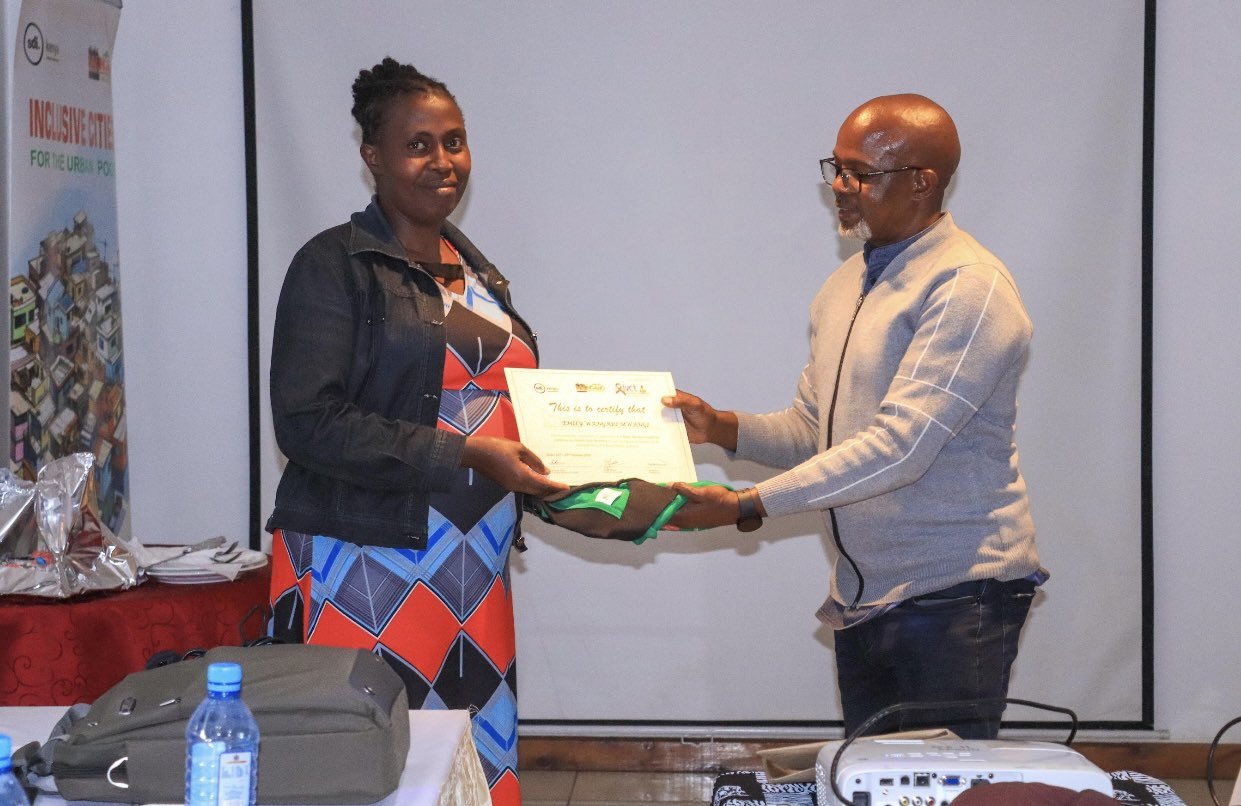Empowering Community Health Promoters: a focus on mental health
By Janet Gitau
Joseph Kimani, ED SDI Kenya, presenting a certificate to Emily Wangari, a Community Health Promoter and Muungano Wa Wanavijiji Federation leader, in recognition of her successful completion of the mental health training.
Photo Courtsey: KYCTV
Mental health in informal settlements is a serious and growing concern, further exacerbated by the onset of the Covid-19 pandemic. Did you know that 1 in every 8 people around the world is living with a mental health condition, with anxiety and depressive disorders being the most common? This is also the case in our community, where residents of these settlements experience the worst physical and mental health outcomes of any population in Kenya. This results from poverty, unemployment, and high rates of violence. Factors such as the low quality of housing and infrastructure, along with a lack of access to water, sewage, garbage collection, healthcare, and other basic services, contribute to poor mental and physical health.
Reducing the current gap in mental health care will require significant effort, with specific tasks, such as mental health treatment, care, and support, being shifted to those with fewer qualifications and minimum standard training, such as the community health promoters. Integrating mental health into primary health care is essential to meet the population's needs, yet it faces many challenges.
Therefore, Muungano Wa Wanavijiji, SDI Kenya, in partnership with LVCT and with the support of The ARISE Hub – Accountability and Responsiveness in Informal Settlements for Equity – a research consortium set up to enhance accountability and improve the health and wellbeing of marginalized populations living in informal urban settlements in low- and middle-income countries, recognized the need for capacity strengthening. They aimed to train Community Health Promoters (CHPs) from different villages in Mathare about mental health and how they can integrate mental health into their daily routine work. This core competency is central to shaping healthcare accessibility and outcomes in underserved communities in Mathare. Once equipped with knowledge, attitudes, skills, and competencies in mental health, CHPs can accurately detect and treat depression and other mental health disorders. This will also help prevent and reduce mental health stigma and discrimination in the settlements.
Community health promoters commonly encounter families and homes experiencing these problems, but they cannot deal with them because CHP trainings don't include comprehensive training on mental health. If more CHPs can be trained in dealing with mental health issues and simple psychosocial interventions, this could be more effective in reducing depression, anxiety, and other common mental health disorders in the community.
CHPs work in the community on a daily basis and therefore hold a position of trust with these individuals and may be the first to become aware of serious issues within the community. The community mostly depends on CHPs to provide basic health care, and with little or no mental health training, it makes sense to train and equip more of them not only with skills but also with medical kits.
CHPs are already encountering these issues regularly but often lack basic knowledge and skills on how to respond. They can be trained to offer psychosocial support in their communities, employ supportive listening skills, create awareness, provide relevant information, and make referrals to specialist support if needed.
The unique position of CHPs provides a great opportunity to contribute to improved mental health care. The training offered by Muungano Wa Wanavijiji, SDI Kenya, in partnership with LVCT, was made possible with the support of ARISE and was a great start, crucial to the CHPs. This will help them address mental health disparities within their communities. They are the frontline health workers and can offer first-line support where needed. With just minimal training, CHPs have the potential to care for and support individuals living with mental disorders and contribute to their treatment needs. The urgent need for CHPs to address mental health issues in informal settlements cannot be overstated. Mental health matters!

